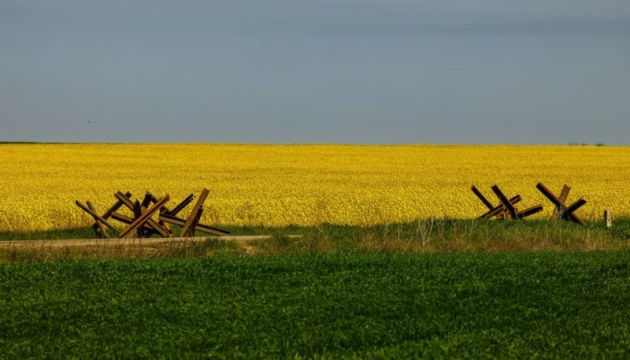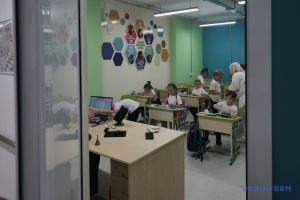
Russia once again threatening Ukrainians with hunger
The Center for Strategic Communication and Information Security explains the essence of Russian manipulation of the food security topic.
What’s the new scare trick?
On Telegram, TikTok, and other social networks, an excerpt from the interview with Leonid Yakovyshyn, CEO Zemlia i Volia LLC (Land and Freedom), is being spread. He talks about the challenges Ukrainian farmers face amid the full-scale war. In particular, he touches upon a price hike for ammonia fertilizers, used to be mostly supplied from Russia.
The Suspilne public broadcaster published the interview on February 6. In three days, an excerpt with a manipulative video commentary by propagandist blogger Andrey Ponomarenko (Ponomar) and the caption “Ukrainians can face hunger in 2023 — farmers can’t sow” was first published in his social accounts and uploaded to YouTube.
A month later, posts about the threat of famine in Ukraine due to the severed access to fertilizers from Russia were simultaneously published by nearly 30 Telegram channels. Russian military correspondents and other propagandists, former Ukrainian politicians Volodymyr Oliinyk with the Party of Regions, Communist Spiridon Kilinkarov (both living in Moscow since 2014), and a network of Telegram channels posing as pro-Ukrainian joined the effort to further spread the narrative.
At the same time, the video was gaining momentum on TikTok.
Another “political immigrant,” Pavlo Onyshchenko, who is also hiding from Ukrainian justice in Russia, not only reposted a Ponomarenko’s video, but also recorded his own videoblog about the “scheduled famine.”
In fact, Leonid Yakovyshyn not only complains about the rise in price for ammonium nitrate, but also shares plans for planting sunflower, soybean, barley, and winter wheat.
The words of the entrepreneur coincide with the forecasts of the Ministry of Agrarian Policy and Food of Ukraine for 2023. According to the outlook:
● due to the rise in price of ammonia fertilizers, farmers partially reorient to oilseeds (sunflower, soybean, rapeseed), the market value of which is at least twice higher than that of grain;
● most of the oilseed harvest, as in previous years, will be exported;
● the volume of the 2023 harvest may decrease by 10-15% due, in particular, to the lower yield of oilseeds compared to grain crops.
Therefore, Ukraine is not facing any famine. Domestic needs in the pre-war period amounted to about 5 million tonnes of high-quality wheat (for the production of bread and other products), 500,000 tonnes of rye, and 3.5 tonnes of fodder wheat (to feed livestock). In 2022, Ukrainian farmers harvested 41.9 million tonnes of grain and legumes, including 19.4 million tonnes of wheat. Even with lower crops, there will be more than sufficient volumes available to cover the domestic demand. After all, the Ukrainian agricultural sector is export-oriented: much more products are sold abroad than left Ukraine.
How Russians intimidate Ukrainians and the world with hunger
Russia traditionally weaponizes all of its resources, whose distribution it influences, and this is not the first time it blackmails the international community with potential hunger.
Having launched a full-scale invasion in 2022, the Russians blocked the Black Sea ports of Ukraine and, accordingly, the export of Ukrainian grain. Because of the Kremlin’s actions, many nations in Africa and the Middle East faced an actual famine threat.
In the end, the long consultations mediated by the UN resulted with the conclusion of “grain deals.” On July 22, in Istanbul, Ukraine, Türkiye, and the United Nations signed an agreement on security guarantees for exporters. The identical document with Türkiye and the UN was signed by Russia. But even taking on clear obligations, the Russians tried to slow down the implementation of the deals and searched for reasons to block the “grain corridor.” At the same time, the Kremlin cynically accused Ukraine of provoking a global food crisis. This message was especially actively promoted in the countries of the Global South, importers of Ukrainian food products.
Russian propagandists did not forget about the Ukrainian audience, trying to use the collective memory of the Holodomor, photos and videos of fields ablaze, as well as reports of mine contamination of farmland and crops being looted. To discredit the “grain deals” and the government that signed them, a message was spread that “all bread will be taken from Ukraine — the Ukrainians will have nothing to eat.” It was distributed by the mentioned “Ponomar” channel.
In fact, the unblocking of grain exports allowed Ukrainian farmers to get money and sow new crops. After all, most of the harvest was intended for sale in foreign markets. And had it remained in Ukraine, it would have been a devastating blow for both the agricultural sector and Ukrainian economy as a whole.
By promoting conspiracy theories and blatantly false “forecasts” about the “scheduled famine,” Russian propaganda is trying to demoralize Ukrainians, further boost anxiety in the context of war, and discredit the Ukrainian authorities and businesses at a time when acute food problems are emerging precisely in territories occupied or destroyed by the Russians.
Center for Strategic Communication and Information Security




